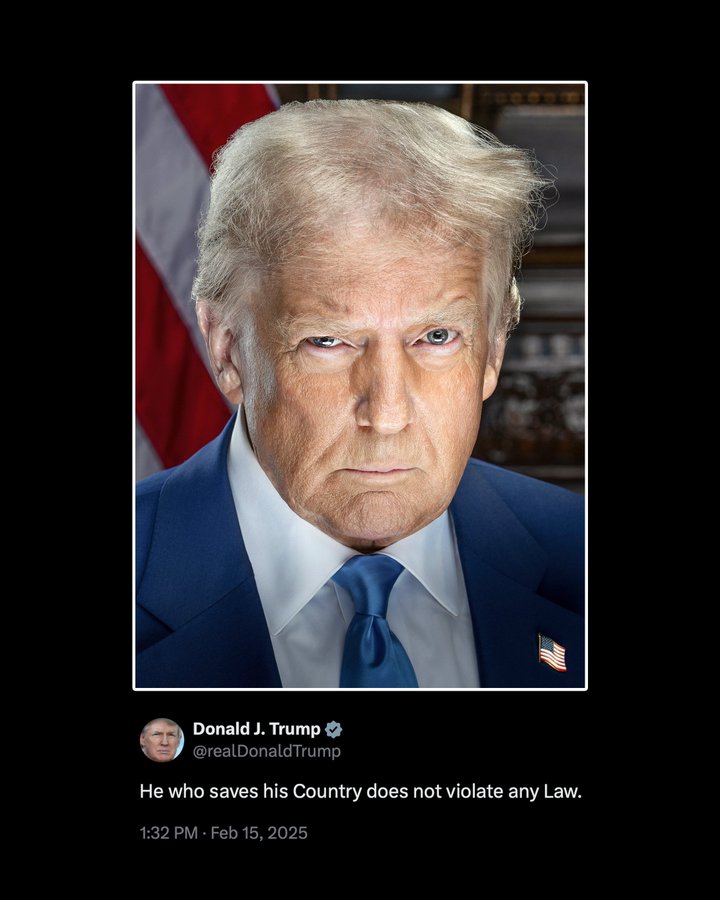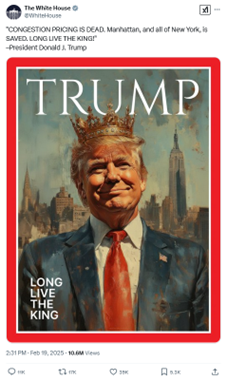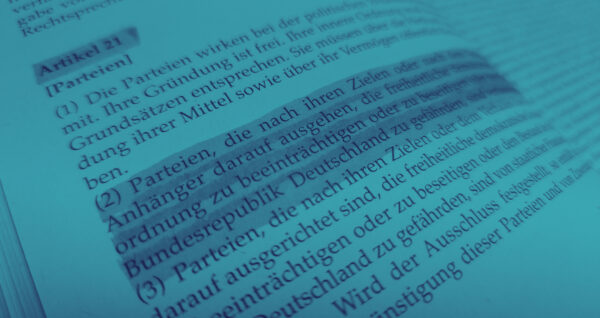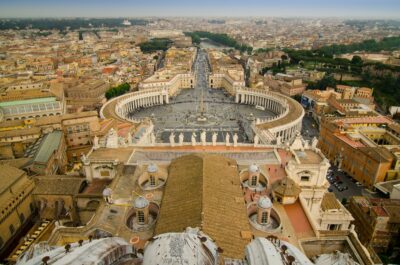Trump’s Counter-Constitution
“He who saves his Country does not violate any Law”

Post from the White House on the platform X
Donald Trump stormed into the American presidency on 20 January 2025 with a battalion of executive orders that destroyed many of the certainties of the American constitutional system. Under normal circumstances, executive orders are the least powerful legal weapon, below the Constitution, below statutes and even below regulations. If the American constitutional system were working, most of these executive orders would have no effect because higher-level law overrides them. But the American constitutional order is changing.
Abolish birthright citizenship, guaranteed in the Constitution’s Fourteenth Amendment! Erase more than sixty years of civil rights legislation and decades of constitutional progress on gender equality! Reverse statutory efforts to curb climate change! Stop payments authorized by Congress on virtually all federal programs without warning! Unsettle thousands of civil service jobs by reclassifying them as political positions requiring loyalty to the president! Trash treaties, abandon international assistance and upset long-standing international alliances and understandings! Throw national security to the winds! All of this, in normal times, would be legally impossible to accomplish through executive orders alone. But these are not normal times.
The Trump administration has followed these executive orders with guidance issued across the government instructing all federal workers that those executive orders “trump” all other sources of law. Those who refuse to honor the executive orders have been summarily fired or placed on administrative leave, along with those whose jobs would not exist if the executive orders were law. Many federal workers have simply quit rather than violate the law as they knew it. A month into the Trump presidency, the federal government is acting as if those executive orders are the only law that counts regardless of what the Constitution, the Congress or the courts have said.
The courts of first instance are not amused. In the first few weeks of Trump’s second term, at least 75 cases were filed challenging not only the creation and elimination of government departments, but also the upending of civil service law and procedures, the impoundment of funds, the cruel changes to immigration rules, the creation with no legal authority of new forms of administrative leaves and buyouts, the apparent permissions given to Elon Musk and his minions to ransack through the most sensitive government databases – and more. In virtually all of these cases, federal trial courts across the country have issued temporary restraining orders or preliminary injunctions requiring the government to stop in its tracks or roll back the changes until the substantive questions raised by these executive orders can be litigated.
++++++++++Advertisement++++++++
ALLE REDEN DRÜBER – WIR WOLLEN ES WISSEN!
Im politischen Prozess besteht (immer noch) Unsicherheit, ob die AfD verboten werden kann. Die Gesellschaft für Freiheitsrechte will das jetzt in einem umfassenden Gutachten klären und sucht dafür erfahrene Jurist*innen sowie Expert*innen.
Mehr dazu unter: https://freiheitsrechte.org/jobs
++++++++++++++++++++++++
It is not clear whether the Trump administration is obeying these court orders. In response to the insistence by two different courts that all federal funding must be restored, for example, the Office of Management and Budget (a chokepoint within the Executive Office of the President overseeing both administrative agencies and the federal budget) rescinded its memo ordering all federal payments to stop. So funds were supposed to flow. But a federal judge found persuasive evidence that the government had not complied with this earlier order because the money still did not reach designated recipients.
Some court orders seem to be followed in theory, disobeyed in practice. The government insists in its legal filings that it has obeyed the courts, but those on the receiving end of these legal victories who are waiting for money, attempting to return to government service or seeking restoration of the status quo ante testify that the enjoined executive orders are still being enforced. One judge, suspecting that the government had lied to her so that it was impossible for her to assess compliance, sternly noted, “Defense counsel is reminded of their duty to make truthful representations to the court.”
Many experts are now saying that we are witnessing a power grab, a constitutional crisis, or even a coup. Those of us who have studied the weakening of democratic governments around the world take no comfort in the similarity between the rapid collapse of government institutions in the United States in the last few weeks and collapsing democracies elsewhere, where aspirational autocrats, emboldened by electoral victory, take office and remove all checks on their power by law. When they get away with it, democracy dies.
The US is now clearly on an autocratic path, paved by law. For Trump, the ordinary citizen, law has always been a weapon to tie his opponents up in knots, to bankrupt them and avoid his own legal obligations by throwing sand in the gears of justice. Now Trump, the president, has weaponized law against the constitutional order with the assistance of a phalanx of lawyers who have declared that we are in a “post-constitutional moment.”
Trump aspires to change the US Constitution quickly, following in the footsteps of Viktor Orbán, Hugo Chávez and Rafael Correa who each rewrote their constitutions in their first year of autocratic consolidation. The US Constitution is practically impossible to amend. Trump is therefore revising the Constitution in the only way that US law makes possible. First, he packed the Supreme Court with judges friendly to his new constitutional vision and now he is making outrageous constitutional claims that he hopes this Court will accept. So far, the lower courts are resisting his attempts to override statutes by executive order on procedural grounds but the Supreme Court may agree with Trump on substance.
In short, there is method to what seems to be madness in these first few weeks of the Trump administration. The executive orders create a coherent picture of what I’ve called a counter-constitution, an alternative constitutional reality proposed in place of a current constitution. In the place of checks and balances, Trump advocates the “unitary executive theory,” which seeks the primacy of executive power, unshackled from constraints from Congress or even the courts.
The unitary executive theory takes inspiration from the fact that the US Constitution, drafted in 1787 before the modern administrative state could be imagined, mentions only the president in Article II on executive power. Advocates of this theory therefore argue that the president is the only constitutionally authorized actor who can exercise executive power so that employee of every government agency must respond to his direct orders.
Never mind that Congress has for over a century created many administrative agencies with varying degrees of independence from the president. As it has created these agencies, Congress has specified that the president may not hire and fire agency personnel at will but only for cause, and has also laid out the missions and priorities that these agencies must follow. The unitary executive theory seeks to sweep away as unconstitutional the constraints Congress has placed on the executive agencies by arguing that the president must be personally able to direct them in every detail.
++++++++++Advertisement++++++++
Loyola University Chicago School of Law Presents
Conference on Global Migration and the Rule of Law
April 11-12, 2025, Rome, Italy
Attend in person or virtually by registering below.
FIND OUT MORE ABOUT THE CONFERENCE
For questions, please contact:
Insa Blanke
Loyola University Chicago School of Law
Executive Director of International LLM and SJD Programs
Iblanke1@luc.edu LUC.edu/law/Internationalllm
++++++++++++++++++++++++
The executive orders are full of statements advocating this view. The boldest is contained in the 18 February 2025 executive order “Ensuring Accountability for All Agencies” which asserts that
“The Constitution vests all executive power in the President and charges him with faithfully executing the laws. . . . [All] executive branch officials remain subject to the President’s ongoing supervision and control.”
In addition, agencies must align themselves with presidential policies and priorities. This unitary executive power also extends to international affairs, as the “One Voice for America’s Foreign Relations” executive order explains.
Under the unitary executive theory, agencies no longer trace their primary constitutional authority to congressional delegation of its legislative powers but instead to presidential delegation of his executive power. If this theory is accepted by the Supreme Court, then the restraints that Congress has imposed until now on the way that agencies operate are likely to be found unconstitutional – and executive orders can indeed override statutes with constitutional authority.
The Supreme Court has already done much to enlarge executive power and to wall it off from congressional constraint. In Trump v. US, decided last summer, the Supreme Court found that the president could not be constitutionally constrained by criminal statutes when he was operating in an official capacity, giving him broad immunity from criminal prosecution. If the full exercise of the president’s powers requires that he not be bound by the criminal statutes, then it doesn’t seem a very big leap to argue that his powers should not be constrained by statutes limiting his power to control agencies and the way that they execute the law.
The present Supreme Court may well hold against Trump on some constitutional questions, birthright citizenship being the most obvious. But given where the Court has been trending in recent years on the question of executive power, a majority may well adopt a version of the unitary executive theory that would give Trump immensely more power. Already in the presidential immunity case, a six-member Court majority has said that “Congress cannot act on, and courts cannot examine, the President’s actions on subjects within his ‘conclusive and preclusive’ constitutional authority” without saying just how far that authority extended. It may in fact extend quite far, under this Court.
Some have claimed that the presidential immunity decision has already enabled Trump to act as a monarch. If the Supreme Court accepts the unitary executive theory in its extreme form, then the United States will be transformed from a constitutional democracy to something much closer to an autocracy. And Trump’s counter-constitution will have won.
And so, on 19 February 2025, Trump reached down from his federal perch using a power that no one was sure he had into a controversy in his hometown of New York, ordering the city to abandon a new congestion pricing scheme that charges cars tolls for entering the busiest parts of Manhattan. As he claimed to have saved New York, he crowed on the White House official X-account: “Long Live the King!”

Post from the White House on the platform X
*
Editor’s Pick
by EVIN DALKILIC

Rarely do I hear culture consuming Bildungsbürger deliberate about the colourful variations of fluffy mould or the explosive powers of hyperactive bacteria and yeasts. Indeed, if the fluff turned pink or the kimchi has to be scraped off the kitchen ceiling, fermentation has not gone as planned. But when it does, bacteria become not only health agents that integrate into our bodies, but also cultural workers that open up whole new worlds of flavour. Who would have thought that bulgur could turn into cheese? All you need is some bulgur, salt and water, and the rest will take care of itself. If you don’t quite trust me, perhaps Sandor Ellix Katz’s book “The Art of Fermentation” will dispel any misgivings you may have about mould.
*
The Week on Verfassungsblog
summarised by EVA MARIA BREDLER
Not only KIM LANE SCHEPPELE is concerned with the US’ slide into authoritarianism. The tangle of executive orders and hostile rhetoric keeps us busy, too. Vice President J.D. Vance’s speech at the Munich Security Conference highlighted yet again the radical nature of the new U.S. administration’s approach. In his speech, he criticised European domestic policies. PHILIP LISTE (GER) is not surprised. He argues that Vance’s rhetoric aligns with Carl Schmitt’s Großraum theory but goes even further, positioning the US as a “movement state” closely aligned with the international far-right movement.
While the Trump administration continues its “flood the zone with shit” strategy by using executive orders, we do our best to filter out the most insidious and significant ones. MICHAEL KUBICIEL and CORNELIA SPÖRL (GER) explain why a seemingly minor executive order on the enforcement of foreign bribery laws could undermine global anti-corruption efforts and severely damage Europe’s economic and security interests.
In this context, law itself is being damaged: It becomes increasingly irrelevant, as outlined in the editorial above. Trump retweeting Napoleon – “He who saves his Country does not violate any Law” – sums it up in ten words. If (constitutional) law is no longer enough to bind political actors to democracy and the rule of law, what can serve as a “Grundnorm”? For JOCK GARDINER (EN), the answer lies in an old and somewhat dusty concept: Honour possesses the necessary cultural potency, political currency, and psychological impetuous, he argues.
The broligarchy around Elon Musk might, in fact, be susceptible to the rather masculinist narrative of honour. We should hope so amidst Musk’s ongoing AI coup, replacing original political administration with artificial intelligence, which is anything but honourable. However, the Europeans should not get too comfortable in the role of critical observers from afar: HANNAH RUSCHEMEIER (EN) uses a recent EU Commission decision to demonstrate that the EU is also susceptible to deregulatory narratives.
Francesca Albanese, UN Special Rapporteur on the occupied Palestinian territories, was supposed to speak at the Free University of Berlin on Wednesday alongside Israeli architect and founder of Forensic Architecture, Eyal Weizman. However, under massive pressure, the university cancelled the event – just as Ludwig Maximilian University Munich had done the week before. ISABEL FEICHTNER (EN) observes a devastating silence in the German international law community. “Where is our outcry?” she asks in an open letter, calling on international law scholars to finally speak out for human rights and against the German state’s complicity in their violation.
++++++++++Advertisement++++++++
The Max Planck Institute for Legal History and Legal Theory is looking to recruit, from 1 October 2025, or as soon as possible thereafter,
Doctoral Students (m/f/d)
+
Postdoctoral Research Fellows (m/f/d)
for the two research fields Legal History of the European Union and Legal Transfer in the Common Law World and, for a Postdoctoral Research Fellow (m/f/d), also for the Max Planck Law Fellow Group Independence and Democracy in the European Union: A Historical and Socio-legal Approach.
More information on your tasks, your profile, our offer and the application procedure are on our homepage https://www.lhlt.mpg.de/job-offers. Your application must be submitted online via the link on our homepage by the closing date of 19 March 2025.
++++++++++++++++++++++++
Sunday is election day in Germany – but not for all eligible voters. Many ballots from Germans living abroad will not arrive in time. Some propose solving the issue by introducing overseas electoral districts. NIKLAS SIMON (GER) is not convinced and suggests alternative solutions.
With 733 seats, Germany currently has the largest freely elected parliament among democratic countries worldwide. For this reason, the last government introduced an electoral reform that will reduce the parliament to 630 seats. It might also reduce the number of female members of parliament, though. CORINNA KRÖBER and LENA STEPHAN (GER) explain this phenomenon and call for a debate on parity.
Germans prepare quite differently for the election. Some binge-watch every TV debate and get annoyed, others doom-scroll on social media and get annoyed. Others may be annoyed about not being invited to a debate themselves. The new populist party “Bündnis Sahra Wagenknecht”, for instance, sued twice after being excluded from the Wahlarena debate, claiming a violation of their right to equal opportunity. Yet even two of Germany’s higher administrative courts are divided on the matter – and probably a little annoyed, too. MADELINE TRAPPMANN (GER) analyses both rulings and declares the Higher Administrative Court of Baden-Württemberg the winner of this legal duel.
Not only official airtime but also private funding is unevenly distributed in the election campaign. This year, CDU, FDP, and AfD have all enjoyed record-breaking donations – most notably, the AfD received a rather scandalous sum of almost €2.35 million from a private donor in Austria. KRISTOF HEIDEMANN (GER) takes a look across the Atlantic to illustrate why undisclosed party donations are particularly concerning and suggests how the issue could be tackled before it escalates like it did in the US.
Across the Indian Ocean, Australia has tackled this issue with a sweeping reform of its party financing laws – or has it? The Electoral Legislation Amendment (Electoral Reform) Act 2025 sounds like a great improvement for transparency and fairness in election campaigning – but may violate the constitution, as ANNE TWOMEY (EN) warns.
Two months into 2025, European courts have already dealt with seven cases concerning pushbacks, each raising crucial evidentiary questions. JOYCE DE CONINCK (EN) explores the implications.
ALISON JOLYNN BEUSCHER, JOHANNA BÜCKER, LAURA GOLLER, LINA SOPHIE MÖLLER, MARLENE STILLER and SARAH ISABEL PFEIFFER (EN) were among a group of scholars who submitted a third-party intervention in the case of C.O.C.G. v Lithuania which concerns pushbacks at the EU’s external border with Belarus. They report about the recent hearing in Strasbourg which centred around the question of whether and how the geopolitical context can affect the level of human rights protection.
For those who can afford it, there is another legal way to enter the EU: buying one’s way in, e.g., via Malta’s citizenship by investment program. The ECJ will soon rule on the program, as it grants not only Maltese but also EU citizenship. SIMON COX (EN) predicts that the ECJ will strike down this practice.
++++++++++Advertisement++++++++
Unsere Redaktion sucht Unterstützung!
Im Rahmen eines Kooperationsprojekts mit dem Max-Planck-Institut für die Erforschung von Kriminalität, Sicherheit und Recht in Freiburg besetzen wir zum 17.03.2025 eine Redakteursposition (m/w/d) mit dem Themenschwerpunkt „Öffentliches Sicherheitsrecht und Strafrecht“.
Du bist Expert*in auf diesem Gebiet und möchtest die Redaktionsarbeit des Verfassungsblog unterstützen? Wir freuen uns auf deine Bewerbung! Die Stellenausschreibung mit allen Daten und Informationen zum Bewerbungsprozess findest du hier.
Bewerbungsfrist: 02.03.2025
++++++++++++++++++++++++
Big money is also at stake in the ECJ’s Seraing case: Should arbitration awards from the Court of Arbitration for Sport (CAS) be subject to EU legal review? While Advocate General Ćapeta argues that CAS rulings should not have res judicata status, ANTOINE DUVAL (EN) proposes to recognise awards only if they comply with European public policy and fundamental due process rights.
This question of legal oversight and fundamental rights extends beyond sports arbitration. Most recently, CDU and AfD proposed in Schwerin’s city council that asylum seekers should be required to work. SUSANNE DERN and FRIEDERIKE LÖBBERT (GER) explain why such work obligations are both constitutionally concerning and practically difficult to enforce.
Another long-standing constitutional concern is the use of surveillance tools. Germany’s Federal Administrative Court recently ruled that the Federal Intelligence Service is not required to disclose information on its use of the Pegasus spyware. SOFIANE BENAMOR (GER) supports this decision, arguing that full transparency in security matters is neither practical nor functional.
When, conversely, does sharing information become an act of disloyalty to the state? Israel now answers this question in three bills, proposing that any cooperation with international judicial institutions, particularly the International Criminal Court, be considered treason, punishable by up to life imprisonment. ITAMAR MANN (EN) illustrates how these laws threaten international legal research at Israeli universities.
Meanwhile, in Serbia, student protests show no signs of waning. The most recent spark was the collapse of a station canopy in Novi Sad, which claimed 15 lives and left two others seriously injured. While the exact cause remains uncertain, many point to corruption and poor construction as likely factors. VIOLETA BESIREVIC (EN) reconstructs the tragedy in five acts, with the title: “What Madonna Got and the EU Did Not.”
Another reconstruction: MATTEO PAOLANTI and FRANCESCO SACCOLITI (EN) trace how Nicaragua transitioned from a democracy to an autocratic family dynasty, seemingly sealed by the latest constitutional reform on January 30.
Ethiopia, too, is grappling with its past. The government has committed to a transitional justice process to confront its history of violence. However, trust is lacking, as the state simultaneously cracks down on civil society and press freedom. TEMELSO GASHAW (EN) explores the path forward.
To end on a hopeful note: The ECtHR has ruled unanimously in Cannavacciuolo and Others v. Italy, recognising a violation of Article 2 ECHR. It involved hundreds of illegal waste dumps operated by the Neapolitan mafia – with the knowledge of the Italian government. For the first time, the ECtHR recognised a violation of the right to life in connection with health damage caused by environmental pollution. For the first time, the court linked the right to life to prolonged exposure to environmental pollution – a turning point for climate and environmental justice, concludes STEFANO ZIRULIA (EN).
*
Take care and all the best!
Yours,
the Verfassungsblog Team
If you would like to receive the weekly editorial as an email, you can subscribe here.
*
“He who saves his Country does not violate any Law.”








It’s not a “power grab”, THIS IS A COUP.